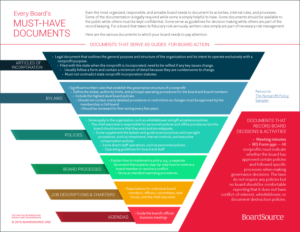Every Board’s Must-Have Documents
Even the most organized, responsible, and amiable board needs to document its activities, internal rules, and processes.
Some of the documentation is legally required while some are simply helpful to have. Some documents should be available to the public while others must be kept confidential. Some serve as guidelines for decision-making while others are part of the record-keeping. For a board that takes its fiduciary role seriously, written rules simply are part of necessary risk management.
Here are the various documents on which your board can rely.
Articles of incorporation
- A legal document that outlines the general purpose and structure of the organization and its intent to operate exclusively with a nonprofit purpose
- Filed with the state when the nonprofit is incorporated; need to be refiled if any key issues change
- Usually follow a form and contain a minimum of detail because they are cumbersome to change
- Must not contradict state nonprofit incorporation statutes
Bylaws
- Significant written rules that establish the governance structure of a nonprofit
- Define the duties, authority limits, and principle operating procedures for the board and board members
- Include the highest-level board policies
- Should not contain overly detailed procedures or restrictions as changes must be approved by the membership or full board
- Should be reviewed for fine-tuning every few years
Policies
- Some apply to the organization, such as whistleblower and gift acceptance policies
- The chief executive is responsible for implementing board approved policies and setting procedures. The difference is akin to the difference between the rules and the law.
- Some policies supplement the bylaws and guide board practices and oversight procedures, such as investment, internal controls, and executive compensation
- Some direct staff operations, such as personnel policies
- Others serve as operating guidelines for board and staff
Board processes
- Explain how to implement a policy, e.g., a separate document that explains step-by-step how the board is built or the CEO is evaluated.
- Processes serve as standard operating procedures
Job descriptions and charters
- Expectations for individual board members, officers, committees, task forces, and the chief executive
Agendas
- Guide the board’s official business meetings
Documents the record of board decisions and activities
- Meeting minutes
- IRS Form 990 — All nonprofits must indicate whether the board has approved certain policies and followed specific processes when making governance decisions. The laws do not require any policies but no board should be comfortable reporting that it does not have conflict-of-interest, whistleblower, or document-destruction policies.
101 Resource | Last updated: February 28, 2023

